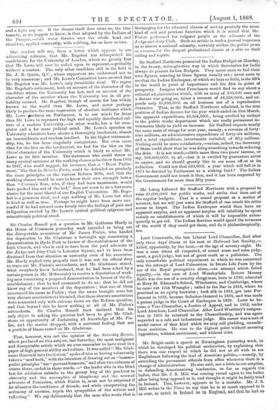Lord Cranworth, the last Liberal. Lord Chancellor, died after only
three days' illness at his seat at Holwood last Sunday,— killed, apparently, by the heat,—at the age of seventy-eight. He was a man whom all respected, of sound sense and calm judg- ment, a good judge, but not of great mark as a politician. The only remarkable political experiment in which he was concerned was the attempt of Lord Palmerston to lreate Life Peers by the use of the Royal prerogative alone,—au attempt which failed signally,—in the case of Lord Wetisleydale. Robert Monsey Rolfe was the son of a couutry clergyman, born in 1790, educated at Bury St. Edmund's School, Winchester, and Cambridge, where he came out 17th Wrangler ; called to the Bar in 1816, where he practised as an equity barrister ; took silk in 1832, got into Par- liament in 1833, became Solicitor-General in 1831, and was made a puisne judge in the Court of Exchequer in 1839. Later he be- came a Vice-Chancellor, a Justice of Appeal, and in 1852, under Lord Aberdeen, Lord Chancellor. After Lord Westbury's resigna- tion in 1865 he returned to the Chancellorship, and was again regarded as a safe and industrious judge. His career was a sort of model career of that kind which we may call plodding, unambi- tious ambition. He rose to the highest point without arousing opposition, without excitement, and without éclat.






























 Previous page
Previous page